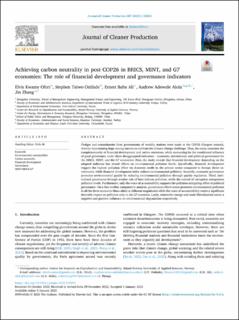Achieving carbon neutrality in post COP26 in BRICS, MINT, and G7 economies: The role of financial development and governance indicators
Peer reviewed, Journal article
Published version
Permanent lenke
https://hdl.handle.net/11250/3087669Utgivelsesdato
2023Metadata
Vis full innførselSamlinger
Originalversjon
10.1016/j.jclepro.2023.135853Sammendrag
Pledges and commitments from governments of wealthy nations were made at the COP26 Glasgow summit, thereby rejuvenating hope among nations to confront the climate change challenge. Thus, the study examines the complementarity of financial development and carbon emissions, while accounting for the conditional influence of good governance under three disaggregated indicators – economic, institutional, and political governance for the BRICS, MINT, and the G7 economies. First, the study reveals that financial development depending on the adopted indicator has mixed effects on environmental pollution levels. Specifically, financial development triggers the highest pollution effect via domestic credit to the private sector compared to foreign direct investments, while financial development index reduces environmental pollution. Secondly, economic governance promotes environmental quality by reducing environmental pollution through quality regulation. Third, institutional governance through weaker rule of laws induces pollution, while the control of corruption antagonizes pollution levels. Furthermore, only the voice of accountability supports the pollution-mitigating effect of political governance. On a bloc-to-bloc comparative analysis, governance effectiveness promotes environmental pollution in all the three economic blocs albeit at different magnitudes while the voice of accountability exerts a significant desirable impact on pollution only in the G7 countries. Lastly, renewable energy and trade liberalization exerts a negative and positive influence on environmental degradation respectively.

